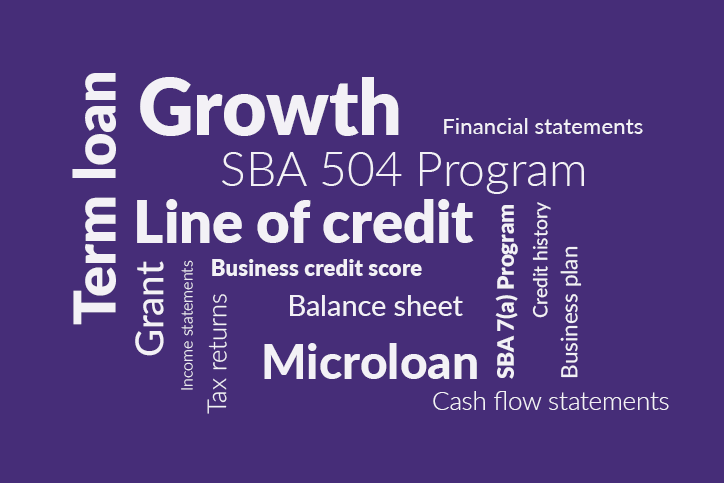Applying for a loan or grant is an exciting step in taking your business to the next level and shaping possibilities for growth. But it can also be overwhelming to figure out what you need to know to start the process. Through the jargon and legalese, it’s difficult to determine what’s right for your business and how to get it.
The following list outlines common terms you’ll encounter when searching and applying for loans and grants. Consider it a starter cheat sheet for navigating the world of lending!
Types of Opportunities for Small Business Owners
- Term loan: The standard small business loan. A lender gives a borrower a set amount of money, and the borrower pays it back within a set timeframe with a fixed or variable interest rate.
- Line of credit: An agreement with a lender that enables a business owner to access funds as needed, up to a set amount. Borrowers pay back lenders within a given timeframe and only pay interest on the funds they use.
- SBA 7(a) Program: The most common SBA loan program for providing funds to small businesses. This program offers loans up to $5 million. SBA 7(a) loans are terms loans with SBA guarantees.
- SBA 504 Program: Provides small businesses with funds specifically for commercial real estate or equipment projects.
- Microloan: Provides funds to small businesses in smaller amounts up to $50,000.
- Grant: Gifts funds to organizations that don’t need to be paid back.
Application Materials for a Small Business Loan
- Credit history: Includes both personal and business credit history. It’s a record of the duration of your existing credit, loans you’ve had in the past, and how reliable you were in paying them off. Your credit history contributes to your overall business credit score.
- Financial statements: Documents that demonstrate the financial standing of your business. These statements can include:
- Balance sheet: A report of your business’s assets, liabilities, and shareholders’ equity.
- Income statements (or profit & loss statements): A report of your business’s income and expenses over a specific timeframe.
- Cash flow statements: A report of how cash came into and left your business over a specific timeframe.
- Tax returns: Complete and unedited tax returns are a required document.
- Business plan: A report about your business’s current activity, future goals, and plans for achieving those goals. It includes your business’s description, financial health (via financial statements), budget, key players and their roles, products and services, market standing, and marketing strategy.
Knowing these terms is a helpful start for pursuing a loan or grant opportunity for your business. But remember, lenders who have your best interest in mind will explain everything you need to know when starting the process and leave no room for confusion. They should provide all relevant information, beginning with terms like those listed above, in a manner that is thorough and easy to understand. When growing your business, you should have access to all the knowledge you need to make the right decision for your business.

